必修一 Unit 2 English around the world Vocabulary review lesson概要
- 格式:ppt
- 大小:1.41 MB
- 文档页数:18
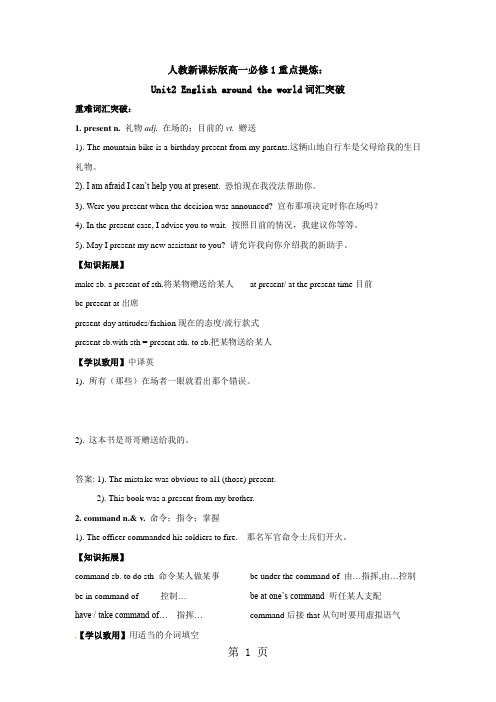
人教新课标版高一必修1重点提炼:Unit2 English around the world词汇突破重难词汇突破:1. present n. 礼物adj.在场的;目前的vt.赠送1). The mountain bike is a birthday present from my parents.这辆山地自行车是父母给我的生日礼物。
2). I am afraid I can’t help you at present. 恐怕现在我没法帮助你。
3). Were you present when the decision was announced? 宣布那项决定时你在场吗?4). In the present case, I advise you to wait. 按照目前的情况,我建议你等等。
5). May I present my new assistant to you? 请允许我向你介绍我的新助手。
【知识拓展】make sb. a present of sth.将某物赠送给某人at present/ at the present time目前be present at出席present-day attitudes/fashion现在的态度/流行款式present sb.with sth = present sth. to sb.把某物送给某人【学以致用】中译英1). 所有(那些)在场者一眼就看出那个错误。
_______________________________________________________________________________2). 这本书是哥哥赠送给我的。
_______________________________________________________________________________ 答案: 1). The mista ke was obvious to al l (those) present.2). This book was a present from my brother.2. command n.& v. 命令;指令;掌握1). The officer commanded his soldiers to fire. 那名军官命令士兵们开火。
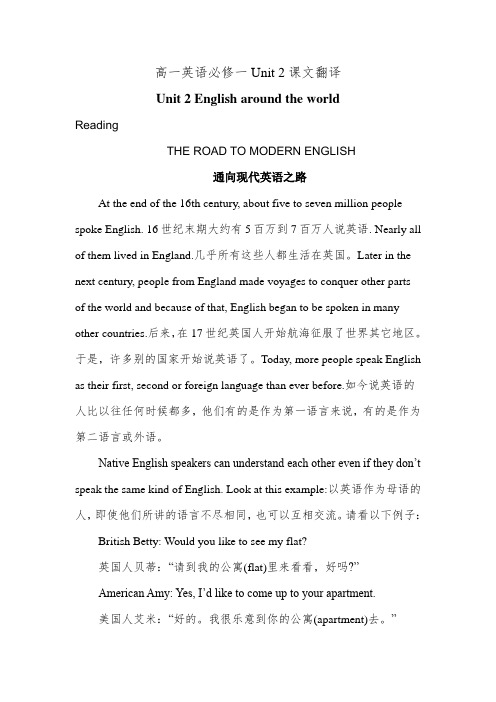
高一英语必修一Unit 2课文翻译Unit 2 English around the worldReadingTHE ROAD TO MODERN ENGLISH通向现代英语之路At the end of the 16th century, about five to seven million people spoke English. 16世纪末期大约有5百万到7百万人说英语. Nearly all of them lived in England.几乎所有这些人都生活在英国。
Later in the next century, people from England made voyages to conquer other partsof the world and because of that, English began to be spoken in many other countries.后来,在17世纪英国人开始航海征服了世界其它地区。
于是,许多别的国家开始说英语了。
Today, more people speak English as their first, second or foreign language than ever before.如今说英语的人比以往任何时候都多,他们有的是作为第一语言来说,有的是作为第二语言或外语。
Native English speakers can understand each other even if they don’t speak the same kind of English. Look at this example:以英语作为母语的人,即使他们所讲的语言不尽相同,也可以互相交流。
请看以下例子:British Betty: Would you like to see my flat?英国人贝蒂:“请到我的公寓(flat)里来看看,好吗?”American Amy: Yes, I’d like to come up to your apartment.美国人艾米:“好的。
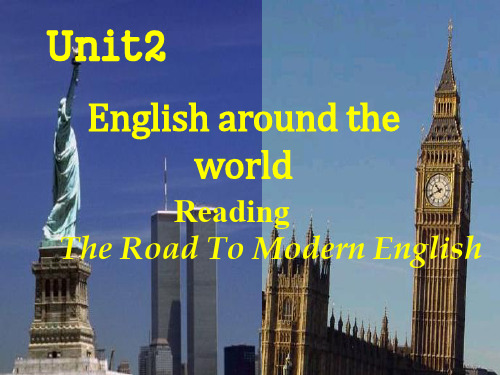

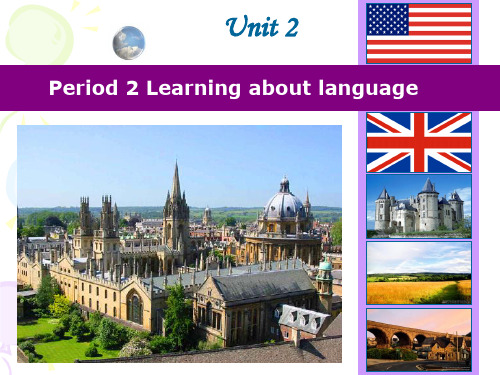

高中英语必修1(Unit2Englisharoundtheworldthe5thperiod)精品教案TheFifthPeriod●从容说课Thisisthefifthperiodofthisunit.Inthispart,twoitemswillbedealtwith,thatis,thewordsleftinthevocabulary,thereadingintheworkbook.Thefirstitem,learningnewwordsleftinthevocabularyistoremovethebarrierinthefollowingstudy.Andhowtoletstudentslearnthewords withinterestisadifficultissue.Ithinkitisbettertogivestudentsthechancetolearnnewwordsbythemselves.Letstudentsloo kupwordsinthedictionaryand thencomm unicatewithothersinclass,whichcaninspirestudents.Andthenletthemmakeupsomesentences.Theseconditemisanotherpassageonthesubject “English”.ItgivesstudentsmuchmoreinformationonEnglish.Todealwiththispassage,7stepsaredesigned:(1)predictwhatwillbetalked(2)listentofindoutanswers(3)answerquestions(4)scanningtofillinatable(5)summary (6)discussion(7)homework●三维目标1.Knowledge:Learningtherestwordsinthevocabulary.2.Ability:Theunderstandingofthereadingpassage.3.Emotion:Guidestudentshowtoremembermorewordsassoonaspossible.●教学重点Theunderstandin gofthereadingpassage.●教学难点(1)Howtoletstudentsmasterwords.(2)Howtoletstudentsunderstandthepassagewell.●教具准备cassetterecorder;cardswithwordsonthe m●教学过程Step1GreetingsGreetthewholeclassasusual.Step2NewwordsandvocabularyT:Yesterday,Iaskedyoutolookupthewordsleftinthevocabularyinthedictionary.Haveyoubeenpreparedforit?Now,let’shaveagame.Let’sdividethewholeclassinto2groups.Eithergroupchoosesonestudentasarepresentative.I’llshowther epresentativeawordoraphrase,sheorheshouldexplainitinEnglish.Ifthegroup’smemberscanguessit,yourgroupwillwin10points.Eithergrouphas5chances.Let’sgo!Possibleexplanation:mand:(1)v.totellsb.todosth.(2)anorder2.standard:generallyusedoracceptedasnormal3.playapartin:playarolein4.dialect:awayofspeakingthatisusedonlyinaparticulararea5.request:(1)v.toasksb.todo(2)n.anactofaskingforsth.inapoliteorformalway6.polite:theoppositeofrude7.retell:totellastoryagainorinadifferentform8.accent:awayofsayingwordsthatshowswhatcountry,esfrom9.recognize:toknowwhothepersonis10.eastern:inorfromtheeast ofacountryorplaceT:Welldone!Nowlet’sdealwiththesomeofthewordsandphrasesindeal.mandv.命令,指挥commandsb.todo;commandsth.;博得,应得commandthat-clausee.g.Hecommandedhismantoretreat.ThetroopswerecommandedbyGerneralHaig.Thekingcommandedthatshe(should)beexecuted.(建议,命令,要求一类词后从句中用虚拟语气,此类动词有suggest,advise,order,request,require,command,demand...)Hecommanded thebuilding(should)betorndown.n.命令[C];指挥,控制[U]e.g.Areyourefusingtoobeymycommands?Youmustobeyhiscommandthatthebuilding(should)betorndown.Takecommandof;beincommand;underone’scommand;underthecommandofsb.e.g.Shetookcommandofthisclassaftertheformermanagerleft.Shefeltincommandofherlife.ThebattleshipisunderthecommandofCaptainBlake.2.requestv.requeststh.(fromsb.);requestsb.todo;requestthat-clausee.g.Youcanrequestafreecopyoftheleaflet(宣传单).Youarerequestednottosmokeintherestaurant.Sherequestedthatnoone(should)betoldofherdecision untilthenextmeeting.n.request(forsth.);request(that)e.g.Requestsforvisaswillbedealtwithwithin48hours.Herrequestthatmoresweetsbeservedwasrefused.3.recognize辨认出;意识到;承认recognizesb./sth.(by/fromsth.)通过……认出……;recognizesth.(assth.);把……认作是……recognizethat意识到;承认e.g.Irecognizedthehousefromyourdescription.Drugswerenotrecognizedasaproblemthen.Nobodyrecognizedhowurgentthesituationwas.Werecognizedthatthetaskwasnoteasy.4.standardn.规格,标准[C&U]raise/improve/lowerstandard提高/降低标准set(sb.)astandard给某人定一个标准e.g.Hesethimselfsuchahighstandardthatheoftendisappointshimself.ofhigh/lowstandard具高/低标准的standards行为标准,道德标准amanofhighstandards一个道德高尚的人Step3ReadingT:WehavelearntEnglishformanyyears.Theninyouropinion,whatisaveryimportanthelptoyourEnglishstudy?S:teachers,books,tapes...T:Anythingelse?IsthereanythingthatyoucanturntoforhelpwhenyouareconfusedwhilelearningEnglish?S:Ithinkadictionaryisagreathelp.T:Yeah.Whenwemeetacrossnewwordsweoftenlookthemupinadictionary.Whatisthemostwidely-useddictionaryinChin ese?S:XinhuaDictionary.T:ThenwhichonedoyouthinkisusedwidelyinEnglish?S:I’msorryIhavenoidea.T:It’s LongmanDictionary andthe OxfordEnglishDictionary.Today,we’llreadapassageonthe OxfordEnglishDictionary.Nowaccordingtothetitle,whatdoyouthinkwillbementionedinthepassage?S:Ithinkthewriter,thetimewhenwasitwritten,whyitwaswritten,howitwaswritten,thefeatureofthedictionarywillbementioned.T:Now,let’slistentoittoseewhetheryouranswerisrigh t.(afterlistening)T:Doyouthinkthatyouranswerisright?S:Ithinkthatitdoesn’tmentionthefeatureofthedictionary.T:Yes.Nowlet’sreaditaloudtoanswerthesequestionsthen.①Whywasitwritten?②Whendiditstarttobewritten?③Whoisthewriter?④Howitwaswritten?S:①Toencourageeverybodytospellthesame.②Theideawasraisedin1857.And22yearsl ater,itbegantobewritten.③Threemenworkedtogetheronthedictionary:SamuelJohnson,NoahWebster,andJamesMurray.④Ittookthethreemennearlyalloftheirlivestotrytocollectwords.T:Goodjob!Thenwhofirstbegantoworkonthedictionary?S:Murray.T:Yes.Nowlet’sreadthelastparagraph.AndthenfinishthetableaboutnotesonJamesMurray’slifewithyourpartners.(checktogether)Step4Consolidation/discussionT:Afterreadingit,canyousaysomethingaboutMurray?Let’sdoachainreaction.EachstudentjustsaysonesentenceaboutMurray.T:Doyouthinkitworthsothesepeople’sspendingsomuchtimeon?Why?Nowdiscusswithyourpartnerandlistsomereasons.(discussforabout3minutes)Now,it’sshowtime.S:Wethinkthatitworththeirjob.Iftherewerenodictionaries,peoplewouldhavenoruletoguidethemwhileusingthelanguage,whichwillleadtoamessinEnglishbecausedifferentpeople wouldusedifferentlawstouseit.Thentherewillbemoredifficul tyinunderstandingoneanother.Withthedictionary,peoplehaveasetruletojudgewhethertheirwayofusingthelanguageisright.Step5SummaryandhomeworkToday,wehavelearnedthewordsleftinthevocabularyandwe’vegotsomeinformationonthelargeEnglishdictionary.Afterclass,pleasereadthewordsagainandagaintorecitethemandtrytousethemtomakeupsentences.●板书设计Unit2EnglisharoundtheworldTheFifthPeriodWordsmand2.request3.recognize4.standardUnderstandingofthepassageGuessingQuestions●活动与探究ThisresearchistodoresearchontheconceptoftheOxfordDictionaryandsomeotherkindsofdictionaryinEnglishspok encountries.SostudentsshouldworkingroupstostudytheitemsoftheOxfordDictionaryandfindoutthenamesofothertypenames Themostpopularone ThereasonAbout theOxfordEnglishDictionaryThe OxfordEnglishDictionary istheacceptedauthorityontheevolutionoftheEnglishlanguageoverthelastmillenniu m.Itisanunsurpassedguidetothemeaning,history,andpronunciationofoverhalfamillionwords,bothpresentandpast.Ittracestheusageofwordsthrough2.5millionquotationsfromawiderangeofinternationalEnglishlan guagesources,fromclassicliteratureandspecialistperiodicalstofilmscriptsandcookerybooks.The OED coverswordsfromacrosstheEnglish-speakingworld,fromNorthAmericatoSouthAfrica,fromAustraliaandNewZealandtotheCaribbean.Italsooffersthebestinetymologicalanalysisandinlistingofvariantspelli ngs,anditshowspronunciationusingtheInternationalPhoneticAlphabet.Asthe OED isahistoricaldictionary,itsentrystructureisverydifferentfromthatofadictionaryofcurrentEnglish,inwhichonlypresent-daysensesarecovered,andinwhichthemostcommonmeaningsorsensesaredescribedfirst.Foreachwordinthe OED,thevariousgroupingsofsensesaredealtwithinch ronologicalorderaccordingtothequotationevidence,i.e.thesenseswiththeearliestquotationsappearfirst,andthesenseswhichhavedev elopedmorerecentlyappearfurtherdowntheentry.Inacomplexentrywithmanystrands,thedevelopmentovertimecanbeseeninastructurewithseveral“branches”.TheSecondEditionofthe OED iscurrentlyavailableasa20-volumeprint edition,onCD-ROM,andnowalsoonline.Updatedquarterlywithatleast1000newandrevisedentries,OED Onlineoffersunparalleledaccesstothegreatestcontinuingworkofscholarshipthatthiscenturyhasproduced’(Newsweek).Tofindoutmoreaboutthe OED Online,whynotfollowourfree tour?“Aboutthe OxfordEnglishDictionary”invitesyoutoexploretheintriguingbackgroundanddistinctivecharacterofthe OED.Here,youwillfindin-deptharticlesaboutthehistoryofthe OED,aninsidelookattheprogrammesusedtoenlargeandupdatethe OED entries,little-knownfactsaboutitscontent,andmuchmore.。

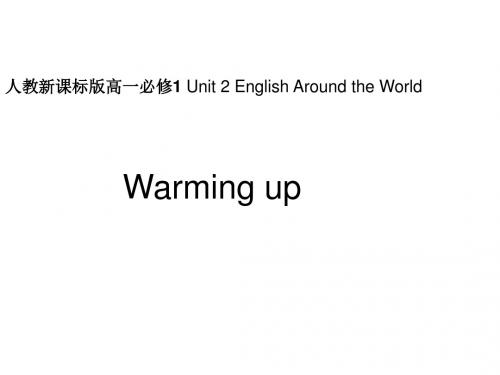

高中英语必修1(Unit2Englisharoundtheworldthe4thperiod)精品教案TheFourthPeriod●从容说课ThisisthefourthperiodofUnit2whichfocusesonlistening.Inthislesson,therearetwoparts.Oneofitistoconsolidatethesentencestructureofindirectspeechanddirectspeech.Theotherpartconcern slisteninginwhichtwopassagesareincluded.BothofthemareaboutthetopicofEnglish.Listeningisbecomingmoreandmoreimportant.Teachingstudentstolisteninproperwayistheaimofthispart.Agoodli stenershouldbeabletopredictaccordingtosomehintssuchasthetopic,thequestionslisted,etc.,tolistenwiththepurposeoffindingusefulinformationandtosummarize.Sothispartshouldbetaughtaccordingtotheaim.Init,we’llfirsthavearevision.Itdealswiththeexercisetalkingonpage48.Thoughttheusageofthesentencepatternsindailylife,studentscanmasterthisgrammarpartmuchbetter.Theirabilityofusinglanguagewillbepracticedaswellinthispart.Andthe nwe’lllistentotwopassages.Inthispart,totrainstudents’listeningskills,Iwilldesignsomequestionsabou tthepassagesothatstudentscanlistenonpurposeoffindingusefulinformation.Besides,studentscanprac ticetheabilityofpredictingwhatwillbeheardinthispart.Atlast,adiscussionwillbeorganized.Thisistotrainstudents’abilityofusinglanguageandreadingcritically.●三维目标1.Knowledge:Reviewthesentencepatternsbyusingthem.2.Ability:GetmoreinformationonEnglishdialect.3.Emotion:Howtohelpstudentsimprovelisteningskill.●教学重点Usethesentencepatternsinlife.Understandthelisteningmaterial.●教学难点Howtoimprovestudents’listeningskills●教具准备cassetterecorder●教学过程Step1GreetingsandRevisionGreetthewholeclassasusual.T:Yesterdaywelearntthesentencepatternswhichexpresscommandsandrequests.Whocantellmesomethingaboutit?S:Toexpresscommands,wecanuse“Do...;Donotdo...”.S:Toexpressrequests,wecanuse“Do...please;Donotdo...please;Willyoudo...?Wouldyoudo...?Canyoudo...?Couldyoudo...?”T:Yes,youareright.ThenhowcanwechangethemintoIndirectSpeech?S:Ifitisacommand,wecanuse“sb.told/orderedsb.todo...;sb.told/orderednottodo...”.S:Ifitisarequest,wecanuse“sb.askedsb(not)todo”.T:Pleasetellwhichoneistherightanswer.“____________,”LiMingsaidtohisteacher.A.Canyoubuymeanewwatch?B.Givemethatbook,C.Lendmeyourbike,D.CouldyouhelpmewithmyEnglish?S:IthinkDistherightanswer.T:Couldyoutellmewhy?S:BecauseAisnotlogical.BandCarecommands.Inlastperiodwelearntthatcommandsshouldbemadebypeoplewhohaveaut hority.SoIthinkhereDisright.T:Yourexplanationisperfect.Step2Talking(WorkbookP48)T:Great.Nowlet’spractisethesentencepatternsbymakingupdialogues.SopleaseturntoP48andlookatthepartoftalking.Ple a seworkingroupsoffour.Andchooseonesituationtorole-play.(5minutesforpreparation)T:Nowlet’sbegin.Possibleversion:Group1:A.(foreigner):Excuseme,couldyougivemeahand?B:Sure.Youseemtobelookingforsomeone.A:Yes.MyChinesefriendsandIpromisedtomeetattheexitofthesubway.B:Couldyouspeakabitslowly.Ican’tquitefollowyou.IguessyouarelookingforyourChinesefriends.A:I’msorry.Iwasn’tnoticingitjustnow.Yeah,wesaidthatwewouldmeethere—theexitofthesubwayat2p.m.Anditis2:15,butIstillcannotfindthem.B:Exit1orExit2?A:Whatdoyoumean?There’re2exits?B:Yes.Herearetwoexits.Soyoushouldbesurewhichoneiswhereyoupromisedtomeet.A:Isee.Iamsurethattheymustbewaitingformeattheotherexit.Thankyouverymuch!Group2:(P:parents;W:waitress;Y:you)P:Excuseme,couldyoutellmewherethetoiletis?W:Er...therestroom?Well,gostraightahead,anditwillbeattheendofthecorridor.P:Butwedonotneedrest.Wearejustlookingforatoilet.Y:ImeanwewanttogotheWC.W:WC?Wedon’thaveone.Y:NoWC!HowcanarestauranthavenoWC?W:I’msorry!ButwhatdoyoureallymeanbysayingWC?Y:It’saplacewherewecanwashhands.W:Ah,Isee.Well,gouptothesecondfloor.Y:Thankyousomuch!(Youandyourparentsgo uptwofloorsbutonlyfindemptyroomsthere.)W:Haveyoufoundit?Y:No,wewentuptwofloors,butwedidn’tfindatoiletbutemptyrooms.Group3:A:Excuseme,couldyouhelpme?B:Sure?What’sit?A:OurEnglishteacheristellingussomethingimportant,butIcanquitefollowher.She’sspeakingsofast.B:Yeah,she’sreallyspeakingfast.ThenhowcanIhelpyou?A:Couldyouasktheteachertospeakalittlebitslowly?B:OfcourseIcan,butwhydon’tyoudoso?A:Er...B:Isee.(StudentBputsup hishand)T:Yes?B:I’msorry,butwouldyouspeakalittleslowly?Step3Listening(Ⅰ)T:Yesterday,wehavelearntsomethingaboutdialectsintheUS.Todayletuslistentothedialoguespokenwithanaccent.Pleaseturntothelis teningpartonP14.Firstlistenandfindouthowmanypeoplethereareinthedialogueandwhotheyare.S:...T:Great!Nowpleaselistentoitagain,andanswerthequestionsonthetextbook.(afterlistening)Haveyougottheanswers?Nowcomparenoteswithyourpartner.T:Areyousureaboutyouranswersnow?Let’schecktogether.T:Youdidaverygoodjob.Nowwewilllistentoitagain.Afterthat,youshouldretellthestorytoyourpartner.See?S:...T:Soyousee,thereissomedifficultyforpeopletounderstandthedialects.Right?So whatwedowhilelearningEnglish?S:WecanlearnstandardEnglish.S:Idon’tthinkso,becausewehavelearntthatthere’snostandardEnglishactually.SoIthinkwhatweshoulddoistopronouncebetter,andusethecorrectwordsandgrammar.Step4Listening(Ⅱ)T:Byreadingthepassage“theroadtomodernEnglish“,wehaveknownEnglishisaworldlanguagewhichisspokeninmanycountriesandareas.Inthisperiodwewilllistentonatives peakersfromdifferentEnglish-speakingcountries.PleasemovetoP51andlookatListeningTask.Nowseveralstudentsina ninternationalhighschoolinShanghaiaredescribingwheretheycomefrom.Whatdoyouthinkyouwillhearintheirintroduc tion?S:Iguesstheywilltalkaboutthelocation,climate,people,custom,specificthings,andsoon.T:Youareveryclever.Weareintroducing someplace,mostoftimewewillgivesom edescriptionoftheclimate,people,custom,people,history,placesofinterests,andsoon.T:Listencarefully,thentellwhichtopicsarementioned.S:...T:Good.ThenIwillplaythetapeagain.Thistimeyoushouldtrytoguessthenameofeachstudent’scountry.S:...T:Goodjob.Thistime,youshouldpaymuchattentiontoeachstudent’sdescription.Afterlisteningitagain,youshoulddescribethecountryusingyourownwords.S:...T:Welldone!NowworkingroupsoffouranddiscusswithyourpartnerswhyEnglishisspokeninsomanyplacesaroundtheworl d.Makealistofthereasonsandthenreportyourgroupworkwithothergroups.Step5SummaryThisclasswehavereviewthegrammarpartbyusingitindailylife.Wehavepractisedreadingaswell.Welearnthelangua geinordertouseit.SoIadviseyoupractiseusingwhatwelearntdailysothattheycanbepartofyourknowledge.Step6HomeworkLookupthewordsleftinthevocabularyinthedictionary.●板书设计Unit2EnglisharoundtheworldTheFourthPeriodSentencepatternsGuessingthetopicsmentionedinthetape●活动与探究Thisactivityistodosomeresearchonthelisteningskills.Studentsarerequiredtosurftheinternettosearchforsomeinfor mationonadviceonimprovinglistening.●备课资料ColorsAmericanshaveusedcolorstocreatemanyexpressionstheyuseeveryday.Wesayweare“inthepink”whenweareingoodhealth.Itiseasytounderstandhowthisexpressionwasborn.Whenmyfacehasanicefresh,pinkcolor,itisasignmyhealthisgood.IfIlookgrayandashen,Imayneedadoctor.Redisahottercolorthanpink.AndAmericansuseittoexpressheat.InEnglish,thesmallandhotpeppers(辣椒)foundinmanyMexicanfoodsarecalled“redhots”,fortheircolorandtheirfiery(火辣辣的).Wesaythatfast,fierymusic,especiallythekindcalled“DixielandJazz”is“redhot”.Blueisacoolercolor.ThetraditionalbluemusicofAmericanblacksistheoppositeoftheredhotmusic.Itisslow,sadandsoulful.DukeEllingtonandhisorchestra(管弦乐队)recordedafamoussong,MoodIndigo(《深蓝的情调》),aboutthedeepbluecolor,indigo.Inthewordsofthesong,“Youaren’tbeenbluetillyou’vehadthatMoodIndigo”.Tobe “blue”,ofcourse,istobesad.Whilethecolorgreenisnaturalfortrees,itisanunnaturalcolorforhumans.Whensomeonedoesnotfeelwell,someonewhoissickforexample,wesayhelooksgreen.Whensomeoneisangrybecausehedoesnothavewhatsomeoneelsehas,wesayheis“greenwithenvy (忌妒)”.Somepeopleare“greenwithenvy”becausesomeoneelsehasmoredollars,or “greenbacks”.Dollarsarecalledgreenbacksbecausethat’sthecolorofthebacksideofthemoney.Thecolorblackisoftenusedinexpressions.Peopledescribeadayinwhicheverythinggoeswrongasa“blackday”.A “blacksheep”isthememberofafamilyorgroupwhoalwaysseemstobeintrouble.A“bla cklist”isillegal(非法的)now,butatonetime,someemployers sharedblacklistsofpeoplewhoshouldnotbegivenwork.Notallthe“black”expressionshavebadmeanings.Abusiness“intheblack”,forexample,isonewithprofits(利润).Acompany“inthered”islosingmoney.Redinkisusedtoshowlossesinafinancialreport.Profitsarewritteninblack.Ifsomeonetellsyoutoputsomet hing“inblackandwhite”,theywantyoutowriteitdown.Insomecases,colorsjustdescribeasituation.A“blackout”,inWorldWarTwo,waswhenalllightswereturnedofftomakeitdifficultforbomberplanestofindtheirtarget(目标)atnight.A“brownout”isanAmericanexpressionforreducedelectricalpowerwhichmakeselectriclightsdim.AmericanwomenusetheFrenchwordforredasthenameofthecoloredcosmetic(化妆品)whichtheysometimesusetobrightentheircheeks.It’sjustcalled“rouge”.Theyuseitespeciallywhentheyaregoingoutfortheevening,orasAmericanssay“topaintthetownred”.Thecoloryellowissometimesusedtodescribeacoward(胆小鬼).Apersonwhois“yellow”hasnocourage.Aperson’sskinmaybecomeyellowasaresultofdiseasesthatattacktheliver(肝).Yellowfeverisone.Inthepast,shipscarryingfevervictimsraisedaflagcalled the“yellowjack”.IntheUnitedStates,anactivisto rgan izationofoldpeoplecallsitselfthe“graypanthers”(灰豹).Thenamecomesfromthegrayhairofitsmembersandfromthepanther,afierceanimalofthelionorleopard(豹)family.WordsandIdiomsToeatcrow乌鸦肉根本没法吃,因此要一个人吃乌鸦,那肯定是非常难受的。
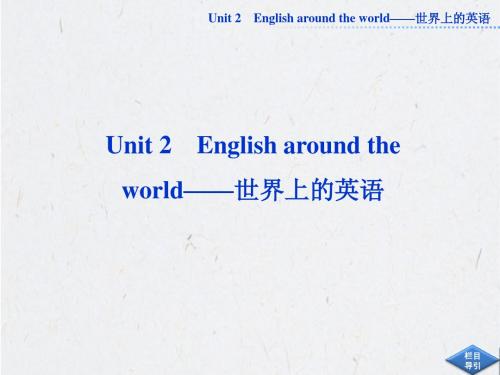
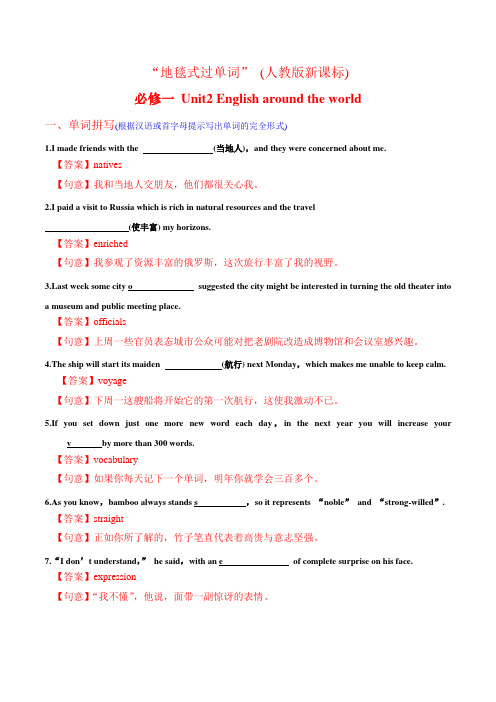
“地毯式过单词”(人教版新课标)必修一Unit2 English around the world一、单词拼写(根据汉语或首字母提示写出单词的完全形式)1.I made friends with the (当地人),and they were concerned about me.【答案】natives【句意】我和当地人交朋友,他们都很关心我。
2.I paid a visit to Russia which is rich in natural resources and the travel(使丰富) my horizons.【答案】enriched【句意】我参观了资源丰富的俄罗斯,这次旅行丰富了我的视野。
st week some city o suggested the city might be interested in turning the old theater intoa museum and public meeting place.【答案】officials【句意】上周一些官员表态城市公众可能对把老剧院改造成博物馆和会议室感兴趣。
4.The ship will start its maiden (航行) next Monday,which makes me unable to keep calm.【答案】voyage【句意】下周一这艘船将开始它的第一次航行,这使我激动不已。
5.If you set down just one more new word each day,in the next year you will increase yourv by more than 300 words.【答案】vocabulary【句意】如果你每天记下一个单词,明年你就学会三百多个。
6.As you know,bamboo always stands s ,so it represents “noble”and “strong-willed”.【答案】straight【句意】正如你所了解的,竹子笔直代表着高贵与意志坚强。

高一英语必修一Unit 2课文翻译Unit 2 English around the worldReadingTHE ROAD TO MODERN ENGLISH通向现代英语之路At the end of the 16th century, about five to seven million people spoke English. 16世纪末期大约有5百万到7百万人说英语. Nearly allof them lived in England.几乎所有这些人都生活在英国。
Later in thenext century, people from England made voyages to conquer other parts of the world and because of that, English began to be spoken in many other countries.后来,后来,在17世纪英国人开始航海征服了世界其它地区。
于是,许多别的国家开始说英语了。
Today, more people speak English as their first, second or foreign language than ever before.如今说英语的有的是作为他们有的是作为第一语言来说,有的是作为人比以往任何时候都多,他们有的是作为第一语言来说,第二语言或外语。
Native English speakers can understand each other even if they don’t speak the same kind of English. Look at this example:以英语作为母语的人,即使他们所讲的语言不尽相同,也可以互相交流。
请看以下例子:British Betty: Would you like to see my flat?英国人贝蒂:“请到我的公寓(flat)里来看看,好吗?”American Amy: Yes, I’d like to come up to your apartment.美国人艾米:“好的。
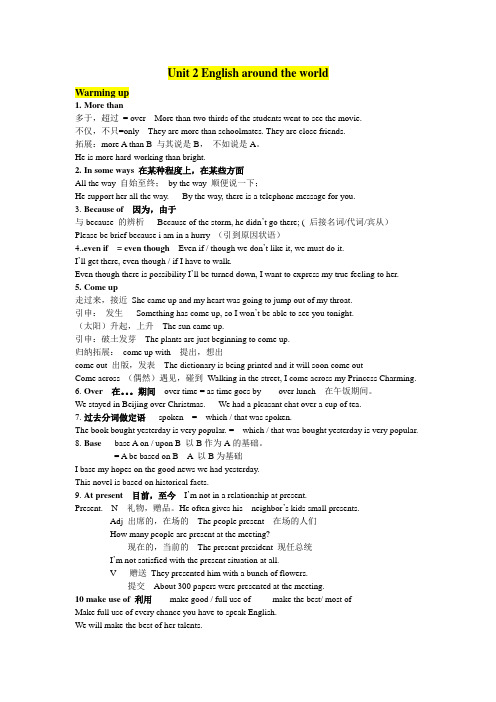
Unit 2 English around the worldWarming up1.More than多于,超过= over More than two thirds of the students went to see the movie.不仅,不只=only They are more than schoolmates. They are close friends.拓展:more A than B 与其说是B,不如说是A。
He is more hard-working than bright.2.In some ways 在某种程度上,在某些方面All the way 自始至终;by the way 顺便说一下;He support her all the way. By the way, there is a telephone message for you.3.Because of 因为,由于与because 的辨析Because of the storm, he didn’t go there; ( 后接名词/代词/宾从)Please be brief because i am in a hurry (引到原因状语)4..even if = even though Even if / though we don’t like it, we must do it.I’ll get there, even though / if I have to walk.Even though there is possibility I’ll be turned down, I want to express my true feeling to her.e up走过来,接近She came up and my heart was going to jump out of my throat.引申:发生Something has come up, so I won’t be able to see you tonight.(太阳)升起,上升The sun came up.引申:破土发芽The plants are just beginning to come up.归纳拓展:come up with 提出,想出come out 出版,发表The dictionary is being printed and it will soon come outCome across (偶然)遇见,碰到Walking in the street, I come across my Princess Charming.6.Over 在。

Unit 2 English around the worldI.Words & Expressions1.official (adj.)官方的,正式的,公务的(n.)穿特定制服的官员(军官)officer (n.)政府官员或高级职员2.voyage (n.)航行,航海航天旅行。
journey长途陆地旅行trip 短途往返旅行tour 旅行一周又转回原出发点(巡回演出)3.conquer(v.)征服conqueror (n.)征服者4.because of 因为由于due to 因为,由于thanks to 多亏,由于owing to 归功于as a result of 由于…的结果on account of 因为….5.native (adj.)本国的,本地的be native to 原产于native language 母语(n.)本国人,本地人6. come at 扑向,袭击come out 出版,出来come true 实现come across 偶遇come on 加油,赶快,算了吧come over (to)顺便来访come to 总计达,达到(某状况)come down 下来,传承come up 走近(to),上来,发生,太阳月亮升起,被提出Eg: He came up and the question why the seeds didn’t come up came up.I’m afraid something urgent has come up.come up with (计划,建议,方案,答案)想出,提出come up to 达到某点,水平,标准When it comes to sth. ,当涉及到某事时6.base (v.)以…为根据base….on/upon….=be based on/upon….根据、以…为基础be based in …..驻扎在….,以…为基地(n.)基地,基础,基部the base of a building建筑物的地基basic (adj.)基本的,基础的basis (n.)准则,要点,基础,方式(复数形式bases)analysis (复数形式analyses)7.present (n.)礼物make sb. a present of sth. 送给某人某物现在at present 现在,目前(adj.)出席的,在场的be present at……参加…..目前的,现在的for the present 目前,暂时up to the present 直到现在,至今(v.)赠送,提交,上演,呈现,介绍present sb. with sth. = present sth. to sb.送给某人某物present a new play 上演一部新戏剧8.make full /good use ofmake the best / the most of 充分利用take full advantage of9.the former…..,the latter…..前者….,后者…..latter (adj.)后者的,制作定语later (adj.)后期的(adv.)后来latest (adj.)最近的,最新的lately (adv.)最近,近来10.identity (n.)本身,本体,身份identify (v.)识别,辨别identification (n.)验明,辨别identical (adj.)完全相同的,同一的11.fluent (adj.)流畅的fluently (adj.)fluency (n.)frequent ( adj.) 频繁的,常见的(adv.)frequently(n. ) frequency 频繁,频率12.play a part in 起到….作用,扮演一个角色,参与play a part /role of…..扮演…..的角色take (an active ) part in…..积极参加…..mand ( n. )( c.)命令(u.)掌握at sb’s command 听某人支配in command of sb 指挥,控制under sb’s command 由…指挥take command of 控制,担任…的指挥have a good command of 精通command(v.)命令,指挥,支配command sb. to do sth. 命令某人做某事command that …(should)do…命令….做…14.request (n.) make a request for 请求,要求….at sb’s request = at the request of sb.( v.)request sb. to do sth.请求某人做某事request that sb. (should ) do sth. 请求….It is requested that …..据请求…..15. 一坚持:insist二命令:order command三建议:advise suggest recommend四要求:request require demand desire再加一个敦促:urge宾语从句的谓语动词用“(should)do”. 16. recognize (vt.)辨认出,承认,公认recognize sb./sth. 辨别出….It is recognized that ….人们公认….recognize that +从句认定/承认….recognize sb./sth. to be / as …认定….,承认…. consider … to be / as …treat / regard ….as… 认为…..是….think of …..as…look on …as….recognition ( n. )承认beyond / out of all recognition 面目全非17. no, all, some , any, few, little ,many, much, several, one + such +n. (such 放在不定代词后面,修饰的名词前无冠词)。

Unit 2 English around the worldGood morning,ladies and gentlemen. I am No.5. It’s my great honor to present my lesson here. My topic today is The road to modern English,from Unit 2 English around the world,Book 1。
To make my presentation much clearer, I will divide my teaching structure into 6 parts.Part 1Analysis of the Teaching MaterialFirst,let me talk about part 1 analysis of teaching material.1. Status and functionThis lesson is a reading passage. It gives a brief history of the English language. It plays an important role in English teaching of this unit. By the end of this class,the students can know better about English language and its development。
2。
Teaching AimsThe teaching aims are established according to High School English Syllabus and the teaching material,which include knowledge aims,ability aims and emotion aims.Knowledge aims:1。

必修一Unit2_English_around_the_world----2fe31b22-6eb2-11ec-862c-7cb59b590d7dunit2englisharoundtheworld关键词地铁<<beauty>地铁电梯;提升汽油<<UK>汽油;毒气。
官方的正式仪式。
航海公务航行征服征服占领祖国;本地人本地公寓单元房actually实际上,事实上base根据n基部;基地,墓础gradual逐渐的.逐步的enrich使富裕;充实,改善vocabulary词汇.词汇量.词表spelling拼写.拼法latter(两者中)后者identity本身.本体fluent流利的.流畅的frequentadj频繁的.常见的利用;例如,充分利用;充分利用;充分利用;充分利用;充分利用;充分利用;充分利用;充分利用;像这样扮演一个角色扮演一个角色;参与是因为;因为1.nativeadj.本土的,本国的,土生的(+to)thegiantpandaisnativetochina.大熊猫是中国特有的动物。
shewasnativetotaipei.她原籍台北。
n.本地人,本国人areyouanativehere,orjustavisitor?你是本地人,或者只是游客?_________________基于。
用法:基本用法NBA基于B。
被动用法基本用法BA基于B。
例如:(1)一个人应该总是以事实为基础。
一个人的被动应该总是以事实为基础atextbook是一种教学物理的方法。
我希望我的朋友们都能来。
a、伊斯巴塞顿布。
巴塞顿克。
贝辛贡德。
这是以杜邦为基础的tteradj.较后的,后面的,(两者中)后者的ifindithardtounderstandthelatterpartofhislecture.我发现他的讲座后面部分很难理解。
didhewalkorswimacrosstheriver?thelatterseemsunlikely.他是趟过河,还是游过河?后者似乎不可能。
